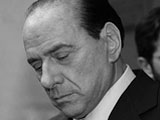Emperor Berlusconi
By Eric J Lyman for ISN
The best estimates are that Italy's Silvio Berlusconi has seen his personal fortune diminish by at least US$2.5 billion since the world financial crisis intensified in July. But the crisis is also helping him consolidate power in a way that money can't buy.
Berlusconi, who started his fourth stint as prime minister in May, is still one of the 100 wealthiest people on the planet. The billionaire's business empire includes three of the country's seven national television networks, a leading publishing company, a major bank, a film production and distribution company and AC Milan, a top-league football club.
His businesses are not immune to the world economic climate. But as the world - and the Italian - economy groans under the weight of collapsing banks, tumbling markets and eroding consumer confidence, Berlusconi has cultivated his image as the calm leader, checking into an Umbrian health spa, joking with television reporters and flying off to Washington for a largely social call with his old friend, US President George W Bush.
It's working: The media tycoon's approval levels have soared, approaching 70 percent, a level not seen since the middle of his previous term, nearly four years ago - an astonishing level during a recession and in a country as polarized as in Italy.
"Frankly, it's embarrassing," Berlusconi gushed about his sky-high approval levels to Il Giornale, the Milan-based newspaper his family owns.
Berlusconi and his government have been quick to use the currency his approval levels provide, increasing the government's power over the economy to levels not seen in a generation.
Since mid-summer, the government has changed laws to make Berlusconi - long hounded by legal problems - immune from criminal prosecution; it has taken steps to limit the investigatory power of the judiciary, it has made executive decrees more powerful and easier to declare; it has deployed troops to the trash-filled streets of Naples; limited parliamentary overview; and taken an important role in the operations and eventual sale of beleaguered flagship air carrier Alitalia. Another move being mulled would dramatically change the rules that govern corporate takeovers, making it more difficult for foreign companies to take over Italian firms.
Notwithstanding a major street march in the capital over the weekend, political opposition to the government's various moves has been minimal.
"People love Berlusconi right now because he is the calm and collected leader of the state, and they believe that in this climate only the state can help them," Maria Rossi, co-director of the polling firm Opinioni, told ISN Security Watch.
The 72-year-old leader has not been shy about making that case. "State aid, which until recently was seen as a sin, has now become absolutely essential," Berlusconi declared in a recent televised news conference.
That may seem to be an unlikely turn for a man who made billions and rose to political power in the free market. But Berlusconi's critics have long charged that the charismatic media tycoon is most comfortable when he can selectively use the state's power to direct the market to act as he would like.
The situation involving Alitalia is a good example: The government suspended antitrust rules, extended loan repayment deadlines and delivered the troubled airline to a group of wealthy associates set to pick a partner from among Europe's three largest flagship carriers, Air France-KLM, Luftansa and British Airways. Finance Minister Giulio Tremonti pronounced the process a triumph of "healthy" state intervention.
Most observers see the current debate in Italy as one over the role of the state in the country's economy, which is mostly accurate. But there's a second battle taking place, one that could have very long-range implications, as most of the power the government consolidates is ending up in the hands of one man.
In other words, Italians could discover that by the end of the current government's term the prime minister's office has become a kind of hybrid, a mix between the parliamentary state the Italian Constitution requires and a centralized presidential-style government Berlusconi says he admires.
The end result could be a kind of "imperial prime ministership," to borrow from Arthur Schlesinger Jr, the late Pulitzer Prize-winning historian. In 1973, Schlesinger famously accused former US president Richard M Nixon of crafting a kind of "imperial presidency" because of his efforts to nefariously shape the government to serve his purposes.
Nixon's government, of course, ended in disgrace. The jury is still out in Italy.

